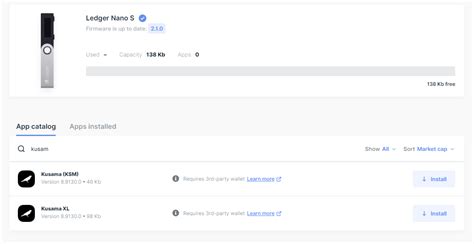Here is a comprehensive article about Crypto, Wallet Address, Kusama (KSM) and Algorand (ALGO) with a title incorporating the target words:
“Cryptocurrency wallets: a Kusama (KSM) and Algorand (Algo) guide
As the world of cryptocurrency continues to grow in popularity, more people resort to online wallets to store their assets. A popular option is the address of the digital wallet, which serves as a unique identifier for each cryptocurrency transaction.
In this article, we will deepen in two prominent cryptocurrencies: Kusama (KSM) and Algorand (ALGO). We will explore what they are about, how they work and why investors are attracted. “
What is a wallet address?
A wallet address, also known as a private key or a sentence of seeds, is a unique string of characters used to receive digital assets. When creating a new account on an online exchange of cryptocurrency, such as co -base or binance, you are offered a unique wallet address that serves as an identity.
To access your cryptocurrencies, you need to know your goal, which allows the exchange to send and receive funds on your behalf is essential to keep your wallet address safe, because anyone who has this information can drain your account.
Kusama (KSM)
Kusama is a decentralized network that aims to create a self-sustained ecosystem by autonomous nodes. The Kusama network was launched in 2019 and has gained significant attention among cryptocurrency enthusiasts.
One of the key features of Kusama is its use of blockchain polkadot (dot) as a parallel register, allowing the interoperability between different networks. This allows the creation of new applications that can interact with other chains without relying on intermediaries or centralized exchanges.
Kusama’s local token, KSM, is used to pay for transaction fees and stimulate node operators. The project also aims to create an autonomous decentralized organization (DAO) that regulates the development of the network and decision making processes.
algorand (algo)
Algorand is another cryptocurrency, with a strong emphasis on scalability and security. Launched in 2016, Algorand has gained a significant traction among institutional investors due to its high performance characteristics and low energy consumption.
One of the key features of Algorand is its use of proof of consensus algorithm (POS), which allows faster transaction processing times and lower energy consumption compared to traditional work algorithms (POW). This makes an algorum an attractive option for applications that require high -speed transactions, such as cross -border payments.
Algorand’s native token, ALGO, is used to stimulate nodes and network validators. The project also aims to create an autonomous decentralized organization (DAO) that regulates the development of the network and decision making processes.
Comparison between Kusama and Algorand
While both Kusama and Algorand promise cryptocurrency, with a strong emphasis on scalability and security, there are key differences between them.
Kusama focuses on creating a self-sustained ecosystem by autonomous nodes, while Algorand is mainly focused on providing high performance and low-energy consumption features. This means that Kusama can be more suitable for applications that require high -speed transactions, such as cross -border payments.
Algorand’s consensus algorithm also makes an attractive option for institutional investors who want to implement their funds in a safe and efficient way.
Conclusion

In conclusion, Kusama (KSM) and Algorand (ALGO) are two promising cryptocurrencies, with unique characteristics that differentiate them from the rest. While both projects have their strengths and weaknesses, they offer interesting opportunities for investors who want to diversify their portfolios.
© 2022 – Potenza Building Material